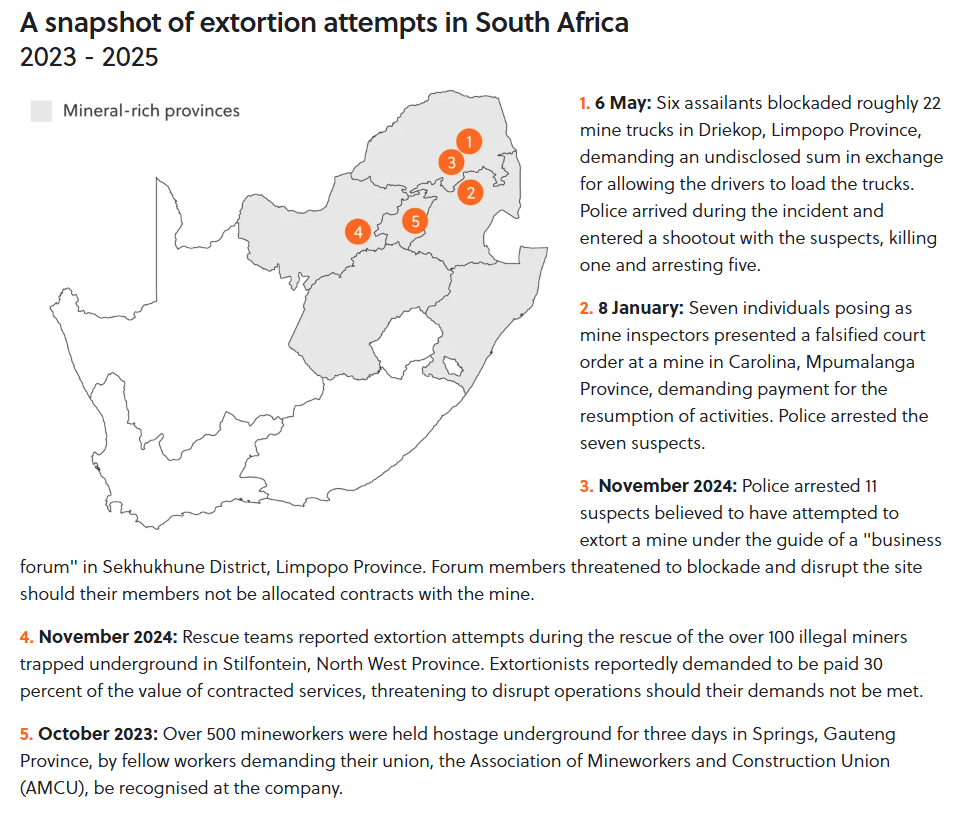Something for nothing: Extortion in South Africa’s mining industry
Extortion has long been a feature in South Africa’s business environment, driven by a range of factors including high unemployment, inequality and ineffective policing. Deeply entrenched in the country’s hospitality, real estate and construction industries, extortion syndicates have increasingly turned their attention to mining – one of South Africa’s most productive industries – which has hampered the sector’s growth prospects.
Tried-and-tested techniques
Criminal groups are employing many tried-and-tested tactics in the mining sector, mirroring those used against hospitality and real estate companies. Protection rackets, where criminals demand payment in exchange for not attacking the business or its staff, have forced the closure of successful businesses as the demanded sum continues to rise. This troubling trend occurs against the backdrop of an under-resourced South African Police Force (SAPS), which also has a reputation for corruption as SAPS officers are sometimes found to be colluding with criminal syndicates in exchange for bribes. Amateur and professional criminal groups have started engaging in sabotage, derailing freight trains, obstructing trucks, and damaging water and electricity infrastructure as retribution for unpaid protection fees.
Beyond this, extortion syndicates have deployed newer tactics field tested in the construction sector. This includes, for instance, the use of so-called ‘business forums’ – networks of often small businesses that operate as lobby groups used to organise extortion attempts and provide a veneer of legality to any resulting gains, which typically take the form of contracts awarded to forum members regardless of their proficiency or even basic capability. In the case of mining, there have been demands that companies employ individuals affiliated with the forum or recognise specific unions. Militant unions have been responsible for several hostage crises in which they forced mineworkers into underground sit-in protests. Such groups frequently cite South Africa’s Black Economic Empowerment Act, which requires that a portion of a company or its supply chain be owned by historically marginalised groups, to contextualise their demands. Extortion attempts, often launched under the veneer of a community protest, frequently escalate to violence or threats thereof, creating a difficult operating environment for companies.

Mining executives are now faced both with rising extortion as well as kidnap-for-ransom and violent crimes countrywide, dampening the appetite to extend investment exposure.
Compounding the slowdown
Rising extortion poses a serious threat to the strategic mining industry, especially amid persistently weak economic growth and a challenging regulatory environment in South Africa. Mining is essential to the country’s growth trajectory, employing nearly 500,000 people and representing almost six percent of GDP in the first three quarters of 2024. Nonetheless, the sector has seen a notable downturn, officially reaching a recession in early 2025 with mining executives reporting limited appetite to break ground on new projects. This gloomy state of affairs is worsened by operational challenges resulting from criminal syndicates sabotaging critical infrastructure, including water and electricity services, by targeting municipal systems to disrupt supply and pressure businesses into compliance. Mining executives are now faced both with rising extortion as well as kidnap-for-ransom and violent crimes countrywide, dampening the appetite to extend investment exposure.
Looking ahead
Companies have responded with a mixture of concessions and collaborating with police to root out syndicates. These approaches have yielded mixed results and there is a major concern that cooperating with criminal elements will only embolden them over the long term. With ongoing concerns over SAPS’s effectiveness in addressing the threats to mining operators, and a widespread lack of public trust in police which may hamper reporting on extortion incidents, it will likely be a long road to creating the kind of environment that remains attractive to foreign investors.
